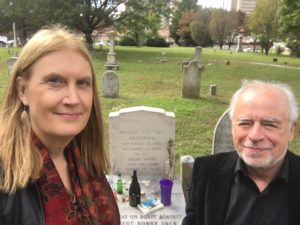On October 20, 2018, the F. Scott Fitzgerald Festival honored my longtime friend, author Richard Russo. I was asked to make the introduction, and to talk about Rick’s work, as well as our friendship. The following is the text from that speech.

Jenny Boylan and Richard Russo at the grave of F. Scott and Zelda Fitzgerald, 10/20/18
Good afternoon. It’s an honor to speak with you today about my friend Richard Russo.
To you, he is the distinguished author of over a dozen books, winner of the Pulitzer Prize, and today’s honoree at the Fitzgerald Festival.
But to me, he’s a friend of over 25 years. And when I think of Rick, the very first thing that comes to mind, in fact, is his cry of sheer terror as he approached the edge of the giant flume in Splash Mountain down in Disney World. This was in Orlando, in a vacation that our families took many years ago. On Splash Mountain—well some of you have been there–, we repeatedly hear an audio-animatronic Brer Rabbit saying to his arch nemesis, Brer Fox, “Let me take you to the Laughin’ Place.” He keeps saying it, as our log-canoes bob and weave through the rushing waters of the ride. “Come on. Let me take you to the laughin’ place.” Rick and I, who have spent many nights in what our spouses Deedie and Barb might euphemistically describe as a laughin place all our own, looked at each other as we approached the final, terrifying waterfall and its ensuing 100 foot drop off into thin air, and then, as we went off the edge, screamed our brains out. When we emerged a little later, soaked to the skin, we were greeted by Brer Rabbit once again, who noted, “I didn’t say it was your laughin place, Brer Fox, I said it was MY laughin place.”
And that’s I think of when I think of Rick Russo, the author—going to the laughin place. His books are literary, smart, painful, sometimes terrifying—but above all, they are funny. Rick’s humor isn’t the easy kind of humor, either, the humor of cruelty, irony, and fart jokes—not that he’d rule out a fart joke, now and again, if the dramatic situation made it absolutely necessary. But Rick’s humor is generous, and forgiving, and quite often right on the edge of something else—sadness, loss, fear. When Rick takes you to his Laughin Place, he’s taking you to a place of truth—a place where you have to laugh because the alternatives are too scary, or too sad.
Over the years, my friend has shown me, and my family, exactly how serious it is, to go to the laughin place.
Our friendship has been tested lots of times, by struggles of our children; by the loss of friends; by the arcane demands of the teaching profession; and by the many highs and lows in the lives of working authors. But most of all, our friendship was tested in 2000, when I came out as transgender. Rick has written elsewhere that all of his important relationships are with women, but that none of those relationships are easy. I think, back in the days of our male friendship, that he felt that in me he’d finally found one relationship that would be uncomplicated.
But in this, he turned out to be disappointed. This time, it was my turn to take us to the laughin’ place—a place of that contained, as always, equal measures of joy and of tears.
At the end of my own transition, I wrote Rick an email thanking him for his steadfastness and his love. He wrote back immediately with the following email:
Boylan – I have always known and never doubted that if I called you, you’d be right there. I had no idea you’d show up in heels, but that’s hardly the point.
Maybe it’s no surprise that humor, mixed with sadness, has been a constant in our friendship, given that it’s a constant in his fiction as well. By that same logic, you might not be surprised by the other constant in the lives of Boylans and Russos, since it too is present in all his books—and that constant is food.
Rick Russo is celebrated for many things—his writing, his good works, his service to the Authors Guild. But what you may not know is that Rick is the best cook I have ever known. If I think about him, the first thing that pops into my mind is—well, like I said, him screaming as we plunged down Splash Mountain– but right after that, I think of the many evenings at his house, with Rick in the kitchen. Mahogany clams. Pork tenderloin. Pizzas fired on the grill. Leg of lamb with garlic and mint. Giant bowls full of noodles and seafood. It was from Rick Russo that I learned how to save the shells of lobsters and put them in a bowl of simmering tomato sauce to give that sauce the warm salty tang of the ocean. It was from Rick Russo that I learned how to make a perfect martini—stirred, not shaken. It was from Rick Russo that I learned to make filet mignon by searing it briefly in a cast iron pan and then sticking the whole pan in a hot oven. And to then serve that steak with a big square of Irish creamery butter melting over the top. It was from Rick Russo that I learned the delights of what writers in maine simply call the Russo aperitif course—the moment at the end of a long dinner when he brings out the tiny glasses for port, or single malt scotch, or pardon the expression, Bailey’s Irish Cream.
It has been a long time since my friend was an altar boy in Gloversville, New York,and it’s been even longer than thatsince the Boylans have had a relationship with the Catholic church, since my own father left the faith in adolescence. But writing of his upbringing this summer, in a piece on the work of Andre Dubus, Rick said, “ though I’ve successfully flushed most Catholic doctrine from my system, the vocabulary of my former faith—sin, redemption, grace—obstinately remains.
I miss how warm the church of my youth had been in winter, how cool and dry in summer. The smell of incense, the tinkling of the bell at communion, the sense of an entire community humble in the face of mystery—these were the soothing rituals that nonbelievers throw out with the doctrinal bath water.
I mention this because something of the rituals of an evening around the Russo’s dinner table—the drinks, the appetizer, the main course, the dessert and the apertifs, all accompanied by laughter, and story—these put me in mind of another Catholic ritual—the eucharist, the breaking of bread and the drinking of wine as symbols of life, and of redemption.
When I was in college, I once went to a mass on a Sunday morning in which the campus priest suggested that this was why we drank beer and ate pizza in our dormitories. It wasn’t only because we were hungry. It was because there was something in the ritual of sharing food and drink that reminds us of the joys—and the sorrows—of being human, joys and sorrows that can only be appreciated in communion with other souls.
If there’s any single unifying theme in Rick’s work, I would suggest it’s not that its characters are all working class men and women in the rust belt—although sure, there’s that. But more important to me is the fact that in almost every one of his books, there are people sharing food in a way that is generous and sustaining. In the very first scene of his very first novel, Mohawk, we meet a chef named Harry, who is opening up the Mohawk Grill, where he meets the town’s lost soul, Wild Bill. Harry sets Wild Bill upon a stool and sets about making him eggs and sausages and toast, in an act that, depending on how you look at it, is either totally commonplace, or the work of a saint.
There are other diners, too, of course—Hattie’s Lunch in Nobody’s Fool; and the Empire Grill in Empire Falls. In his books, as in our lives together, a lot of the most important things have taken place around a table. When we read Rick’s work, we are being reminded of what it is to hunger, to desire, and also what it is to be filled.
My favorite one of these scenes takes place about halfway through Rick’s novel Straight Man, when two characters are gathered, of course, in a restaurant. One, named Tony, has ordered a healthy dish of trout. Our hero, hank, meanwhile, has ordered the prime rib. “I’m astonished,” Hank says, “to discover that I have an excellent appetite for my prime rib, which has arrived sweet and bloody. Tony picks up his trout then finally asks if he can have a taste of my dinner. When I start to carve off a portion, he stops me. “Just the fat,” he explains, leaning over to take the piece he wants from the tail. He chews it with something a kin to religious ecstasy.
That chapter then ends with the single observation: we do not want what is good for us.
That line—teetering between irony and truth, between comedy and sorrow—delivered between two people sharing a meal, in a ritual which makes clear the love they have for one another—well, to me that’s Rick Russo, dropping us all off the edge, leading us, once again, to the laughin place, the most serious place on earth.
I’m delighted that you’ve chosen to give rick the Fitzgerald award this year. I know that there are many writers—young and old—in the audience, and I hope that you will find in your lives what I have found in mine—love, inspiration, and most of all, the shared feast of friendship. There have been times when, in thinking of my friend, I think of the relationship between another mismatched pair, Charlotte the spider, and Wilbur the pig. In Charlotte’s Web, the spider—that’s me—looks to the pig—that’s russo—and says,
“You have been my friend. That in itself is a tremendous thing. I wove my webs for you because I liked you. After all, what’s a life, anyway? We’re born, we live a little while, we die. A spider’s life can’t help being something of a mess, with all this trapping and eating flies. In our friendship, you lifted up my life a trifle. Heaven knows anyone’s life can stand a little of that.”
Later, after she’s gone, Wilbur—the pig—thinks of the life he has lived:
It was the best place to be, thought Wilbur, this warm delicious celler with the garrulous geese; the changing seasons, the heat of the sun, the passage of swallows, the nearness of rats, the sameness of sheep, the love of spiders, the smell of manure, and the glory of everything. It is not often you have a good friend who is also a great writer. Charlotte—by which I mean Russo– was both.
Ladies and gentlemen, a great American writer, a national treasure, and a really good cook. My friend, Richard Russo.

